

Hyper-slow sea microbes give hope for life on Mars. Russia’s Antarctic probes to be tested in Ladoga Lake. Canadian satellite system under budget cloud. Posted on behalf of Hannah Hoag.

Missed deadlines and an underfunded Canada Space Agency (CSA) may scuttle plans to build the next generation of earth observing satellites, according to the Canadian satellite company pegged to build them. In 2010, the CSA selected MacDonald, Detwillier and Associates Ltd. to design the successor to Radarsat-2, the agency’s current earth observing satellite. The company came up with a three-satellite system that would provide information for maritime surveillance, disaster management and ecosystem monitoring. What is life? Follow the bits. Nicolle Rager Fuller / NSF An artist's conception shows an RNA molecule, which may have served as an early form of life on Earth.

By Alan Boyle, Science Editor, NBC News The debate over the definition of life is getting messier and messier, but one of the pioneers on the biochemical frontier is suggesting a method to tell whether scientists are actually looking at a new form of life: Follow the bits of information that are contained in the chemistry. "How many heritable 'bits' of information are involved, and where did they come from? " Scripps Research Institute biologist Gerald Joyce asks in an essay published today by the journal PLoS Biology. By that definition, we're not yet close to identifying alien life, in the lab or in the cosmos, Joyce told me today. "We've had enough of these false alarms that I'm getting a little nervous that the public is going to perceive it as 'crying wolf,'" he said.
Bugs in the ice sheets: Melting glaciers liberate ancient bacteria. Scientists inspect ice inside a back-lit snow pit at the Western Antarctic Ice Sheet Divide research station on Antarctica.
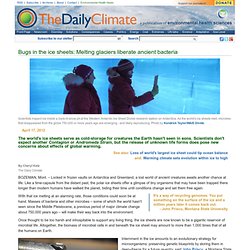
As the world's ice sheets melt, microbes that disappeared from the globe 750,000 or more years ago are emerging - and likely reproducing. Photo by Kendrick Taylor/WAIS Divide. April 17, 2012. Radio: Programs: Searching for new forms of life on Earth. Between 2013 and 2014, Russian scientists plan to send an underwater robot to the bottom of Lake Vostok on the Antarctic continent which they claim may be a haven for unknown bacteria and other single-celled organisms that have evolved to live in conditions in which other life forms are unable to survive.
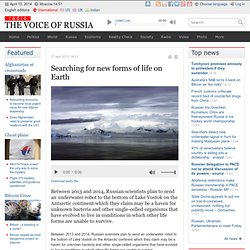
In early February 2012, Russian research ship Akademik Fyodorov broke through into Antarctica’s largest sub-glacial lake which is thought to have been sealed off for millions of years. What's Under Antarctica? Quake Waves Give First Look ? Seismology. Thanks to a technological explosion in the century since humans first set foot at the South Pole, Antarctic research is thriving.
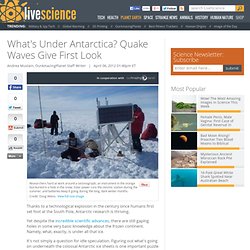
Yet despite the incredible scientific advances, there are still gaping holes in some very basic knowledge about the frozen continent. Namely, what, exactly, is under all that ice. It's not simply a question for idle speculation. Antarctic lake frozen under 2 miles of ice offers up mystery. SALT LAKE CITY — Russian scientists recently completed the longest ever ice core drill of 3,768 meters (12,400 feet) and pierced the ice shield of the surface of one of 280 known freshwater lakes on the frozen continent of Antarctica on Feb. 5.
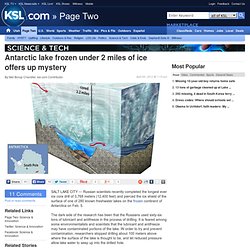
The dark side of the research has been that the Russians used sixty-six tons of lubricant and antifreeze in the process of drilling. It is feared among some environmentalists and scientists that the lubricant and antifreeze may have contaminated portions of the lake. IN order to try and prevent contamination, researchers stopped drilling about 100 meters above where the surface of the lake is thought to be, and let reduced pressure allow lake water to seep up into the drilled hole.
Russian geographer Andrey Kapitsa, from 1959 through 1964, conducted seismic soundings as part of the Soviet Antarctic Expeditions intending to measure the ice thickness. She theorized that there were frozen lakes underneath the ice. Exclusive: Antarctica's Most Notorious Viking—Lost Again. An apparent suicide-by-sailboat misadventure is being closely monitored by Navies around the Antarctica's Southern Ocean.
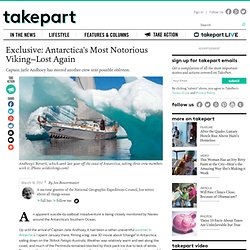
Up until the arrival of Captain Jarle Andhoey, it had been a rather uneventful summer in Antarctica. I spent January there, filming a big, new 3D movie about “change” in Antarctica, sailing down on the 74-foot Pelagic Australis. Weather was relatively warm and wet along the coast, and much of the Peninsula remained blocked by thick pack ice due to lack of winds.
A lecture on nature. By Lee Chang-kook Have you ever heard of Lake Vostok?

Probably not, because it is not on the ordinary map of the world, nor is it on the surface of the earth. It is under the earth. To be more exact and specific, it lies two miles (3.2 km) below the solid ice of the Antarctica. I myself had not heard of it until I read an article written about it in the recent issue of the weekly news magazine, TIME (March 12, 2012). Oh yeah? Well, wait. Russia May Sink Satellite Salvage Plan For Antarctic Internet Connection. A modern, state of the art communications satellite stranded last August in a useless orbit will constitute a double failure if Russian officials de-orbit the spacecraft as planned, according to an expert from the team hoping to salvage the spacecraft.

The Russian Express-AM4 satellite, built by Astrium, was designed for geosynchronous orbit, but stranded in a six hour elliptical orbit at an inclination of 51 deg by a Proton Briz-M upper stage failure last August. Underwriters later declared the satellite a total loss and paid the insurance claim to the Russian Satellite Communications Co. (RSCC), owners of the spacecraft. Polar Broadband Ltd. (PBL) is working with satellite industry insurance experts and investors to salvage Express AM4, and both reposition and repurpose it in support of the international science community in the Antarctic. Readdy is a former Navy test pilot, and NASA astronaut.
Loucks continued: "The Astrium satellite is actually very well built and adaptable. 10 mysterious places to visit. 32,000-year-old Arctic flower: Ancient remains used to grow plant not seen in millennia. In a discovery that may herald the Jurassic Park-style resurrection of mammoths and sabre-toothed tigers, Russian scientists have grown a plant from the frozen remains of a 32,000-year-old Arctic flower.

The plant is a narrow-leafed campion grown in petri dishes from organic materials pulled from the banks of the Kolyma River in Siberia. Details of the project appear in Tuesday’s issue of The Proceedings of the U.S. National Academy of Sciences. It was drafted by a team led by Svetlana Yashina and David Gilichinsky of the Russian Academy of Sciences. Tragically, Mr. Antarctica: An Intimate Portrait of the World's Most Mysterious Continent by Gabrielle Walker – review.
Antarctica used to be a place that only a very few people got to see – the sole reason for going was that it was there and an enormous challenge. Then following the Antarctic Treaty of 1961, it became a focus for international scientific research. Now the Antarctic – for better or worse – holds the key to our future and we interrogate it anxiously for portents. Gabrielle Walker's book comprehensively brings us up to date on the continent that is so much more than ice and seasonal penguins. Insight into alien life in Antarctic ice. Email After two decades of drilling in the frozen wastelands of Antarctica, Russian researchers have finally managed to drill down to lake Vostok, which has been sealed under kilometers of ice for over 15 million years. When they first announced they reached the water, biologists were ecstatic; not only did they get a unique chance to fill in some evolutionary gaps, but they also have access to organisms which have evolved differently then other ones from our planet.
But they weren’t the only ones to be thrilled – this could also offer extremely valuable information about the chances of finding life in the most unlikely of places, such as the ice-crusted moons of Jupiter and Saturn. Now, researchers don’t expect any ‘alien life’ in lake Vostok, but any living creatures found there are definitely on a slightly different evolutionary path in the millions of years that have passed. Revealing details on one of the world's most freshwater sources.
Vostok Station stands on a huge lake that ranks fifth on list of fresh water reservoirs in the world. Its surface is concealed by about 13,000 feet of ice. But, most importantly, it has never been touched by anyone. For 23 years, first Soviet and now Russian, scientists tried to drill into to Lake Vostok. Lake Vostok: Race is on to discover life in 'mythical' subglacial Russian lake. By Alissa de Carbonnel MOSCOW — The race is on to discover life in the most remote and extreme environment known on Earth.
Russia has set the pace, piercing through Antarctica’s icy crust to reach a freshwater lake to try to find ancient or new kinds of life that have adapted to the extremely cold, sunless climate and may shed light on the origins of evolution. Scientists from the United States and Britain are close on Moscow’s heels, sure that their technology will speed analysis of the depths, hidden away for tens of millions of years. If life is found in the icy darkness, it will provide the best answer yet to whether life can exist on other planets like Mars, Jupiter’s moon Europa or Saturn’s satellite Enceladus.
Lake Vostok Breakthrough In Antarctica Hailed By Vladimir Putin. MOSCOW -- Prime Minister Vladimir Putin on Friday praised the Russian scientists who have reached a gigantic freshwater lake in Antarctica hidden under more than two miles (3.2 kilometers) of ice, a pristine body of water that may hold life from the distant past. On national television, Russia's natural resources minister gave Putin a canister of water from melted ice at the bottom of the boreshaft near the surface of Lake Vostok. The footage appeared aimed at showing Russia's scientific prowess and helping Putin's bid to reclaim the presidency in March's election. Putin hailed the discovery of Lake Vostok as a "great event" and said the research team members will receive national awards.
After more than two decades of drilling, the Russian researchers reached the lake on Sunday at a depth of 12,366 feet (3,769 meters) in a location about 800 miles (1,300 kilometers) east of the South Pole. Lake Vostok: Life May Be Found Under Antarctic Ice Sheet. * Russian expedition says broke through to lake on Feb. 5. Alien Life Clues in Antarctic Ice? — Buried Lake Vostok may hold unknown life forms. Cornell Professors Say Antarctic Drilling May Uncover New Species. The Spoof : Lake Vostok twinned with Bazalgette's Thames Super Sewer blueprints funny satire story. Antarctica - Russian glaciologists today measured the ancient alien latrine by sonar and said it looks remarkably like blueprints for the proposed £5 billion Thames Super Sewer.
This was first dreamed up by renowned Victorian civil engineer Sir Joseph Bazalgette - who saved London from cholera by building a huge subterranean sewerage system. Until this weekend the inspiration behind his iconic drawings for the 21st century marvel was always assumed to be whimsy. Alien invasion poses grave risk to Antarctica's ecosystem, experts warn. By Pauline Askin SYDNEY — In the pristine frozen continent of Antarctica scientists fear an alien invasion — not from outer space, but carried in people’s pockets and bags.
Vosztok-tó: 40 év fúrás, 40 liter víz, megszámlálhatatlan elvárás » Think Outside The Box. Külföld - Leégett Brazília antarktiszi kutatóállomása. A Vosztok-tó titka. Hosszú évek munkája után orosz kutatóknak sikerült átfúrni a Vosztok-tó jegét, és bebocsátást nyerni egy ismeretlen, jég alatti világba. Az Antarktiszon mintegy háromszáz jégfelszín alatti tó található, amelyeknek egyikét sem sikerült feltárni, így az expedíció sikeressége történelmi jelentőségű. A kutatók abban reménykednek, hogy a tóban izgalmas felfedezések várnak rájuk az Antarktisz történelmével kapcsolatban. A Vosztok-tó sokat mondhat a jegesedés előtti Antarktiszről : Oroszország Hangja. Tudomány - Putyin már kapott mintát a Vosztok-tóból. Vosztok-tó folyékony vízlencse az Antarktisz jégpáncélja alatt, amelyet orosz kutatók megfúrtak.
A legújabb információk szerint valóban elérték a Vosztok-tó vizét a február 5-i fúrással az orosz kutatók. Közel 40 liter vizet nyertek belőle, és állításuk szerint közben a tó nem szennyeződött be. A minta részletes vizsgálata csak decemberben kezdődhet. Friss információ, csütörtök A fúrás során nyert adatok részletes elemzése alapján kiderült, hogy a kutatók elérték a tó vizét, tehát nemcsak a közvetlen felette lévő jégrétegből sikerült mintát venni. Jég alatti ősi tó: Hitler-legendákat hoztak felszínre az orosz tudósok. 2012. február 09., csütörtök, 21:51 • Utolsó frissítés: 2012. február 09., csütörtök, 22:02 Szerző: hvg.hu Az elmúlt napokban több régi városi legendát kaptak fel ismét Oroszországban azt követően, hogy helyi tudósok sokéves fúrás után elérték az Antarktisz négy kilométeres jégpáncélja alatt rejtőzködő Vosztok-tavat, amely húszmillió éve el volt zárva a külvilágtól. A tudósok reményei szerint a hermetikusan elzárt tó vízében olyan új életformákat, legfőképp mikroorganizmusokat fedezhetnek fel, amelyek révén megismerhető ezen élőlények törzsfejlődése.
A Vosztok-tóban ugyanis nagy valószínűséggel a ma ismert felszíni mikroorganizmusoknál jóval kezdetlegesebb, ősi mikrobáknak adhat otthont. Vladimir Putin receives a 'drink fit for dinosaurs' Tudomány - Robottal merülnek majd a Vosztok-tóba. Ice-Fishing in the Deepest Depths. AM - Great hopes for science from Lake Vostok discovery 11/02/2012. What are the Russians doing drilling 2 miles into Antarctica? Fordító. Drills and spills in Antarctica - Daily News. Fordító. Fordító. New infections from Antarctic lake possible – UK scientist. Fordító. World War II Rumor About an Ancient Lake Is Revived. National Geographic - Föld - Elérték a Vosztok-tavat a kutatók! Baktériumokat találtak a Vosztok-tó feletti jégben. Januárban elérhetik a Vosztok-tó vizét. A Vosztok-tó rejtélye // Csak azért is. Orosz áttörés az Antarktiszon. National Geographic - Föld - Rejtélyes déli-sarki tavat kutatnak az orosz tudósok.
[origo] címkék. Nagyon ősi, ismeretlen életet rejthet a Vosztok-tó. Tudomány - Feltárják a világ legnagyobb, jég alatti tavát. Vosztok-tó. Vosztok-tó folyékony vízlencse az Antarktisz jégpáncélja alatt, amelyet orosz kutatók megfúrtak. Vosztok-tó. Vosztok-tó, Antarktisz: hőfúrófejjel jutnának le a jégalatti tó vizéig. Tudomány - Így fúrták meg a Vosztok-tavat. How Can You Tell If You’ve Hit an Antarctic Lake?